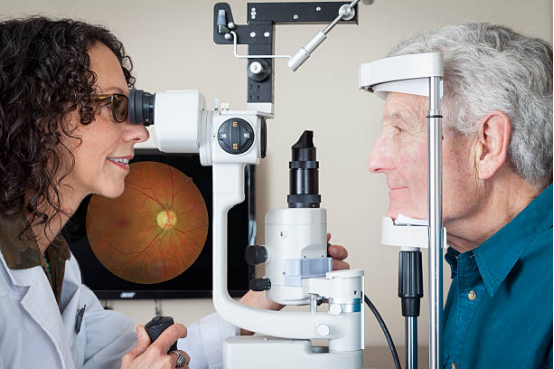Understanding Macular Degeneration: Causes, Symptoms, and Treatment Approaches
Macular degeneration, also known as age-related macular degeneration (AMD), is a widespread eye condition, particularly affecting individuals over 50.
Macular degeneration, also known as age-related macular degeneration (AMD), is a widespread eye condition, particularly affecting individuals over 50.

As the leading cause of vision loss in older adults, this chronic, progressive disease primarily damages the macula, a vital part of the retina responsible for sharp, central vision. In this article, we’ll delve into the causes, symptoms, and treatment options for macular degeneration.
What Is Macular Degeneration?
The macula is essential for tasks that require detailed vision, such as reading, driving, and recognizing faces. Macular degeneration occurs when the macula deteriorates, causing central vision to become blurred or distorted. This condition generally affects both eyes, though the severity and progression of vision loss may differ between each eye.
Types of Macular Degeneration
There are two main forms of macular degeneration: dry AMD and wet AMD.
1. Dry Macular Degeneration
The most common type, dry AMD accounts for about 90% of cases. It develops slowly due to the buildup of yellow deposits called drusen in the macula. As these deposits grow, the macula thins and becomes damaged, leading to reduced central vision, making it harder to perform activities that require fine vision.
2. Wet Macular Degeneration
Wet AMD, though less common, is more severe. It occurs when abnormal blood vessels develop under the retina and leak fluid or blood into the macula, leading to rapid and significant vision loss. If left untreated, wet AMD can cause permanent damage.
Causes and Risk Factors
The exact cause of macular degeneration is still unclear, but several factors are known to increase the risk of developing the condition:
- Age: The risk of developing AMD increases significantly after age 50.
- Family history: A family history of macular degeneration raises the risk.
- Smoking: Smoking is a major contributor to both dry and wet AMD.
- Ethnicity: Caucasians are at a higher risk compared to other ethnic groups.
- Obesity: Being overweight or obese may increase the likelihood of developing macular degeneration.
- High blood pressure: Hypertension can increase the risk, particularly for wet AMD.
Symptoms of Macular Degeneration
In the early stages, macular degeneration might not cause noticeable symptoms. However, as it progresses, the following signs may appear:
- Blurred or distorted central vision
- A dark or empty spot in the center of the visual field
- Difficulty reading or recognizing faces
- Reduced color vision
- Trouble performing tasks requiring detailed vision
If you notice any of these symptoms, it’s essential to seek a professional eye examination.
Treatment Options for Macular Degeneration
Although there is no cure for macular degeneration, several treatments can slow its progression and help manage the condition:
- Anti-VEGF Injections: For wet AMD, anti-vascular endothelial growth factor (VEGF) medications are injected into the eye to stop abnormal blood vessels from growing and leaking, helping preserve vision.
- Photodynamic Therapy: This treatment uses a cold laser combined with a light-sensitive drug to target and destroy abnormal blood vessels in the macula.
- Low Vision Aids: For advanced stages of AMD, magnifiers, telescopes, and specialized glasses can assist with daily tasks and help make the most of remaining vision.
- Lifestyle Adjustments: Healthy habits such as quitting smoking, eating a balanced diet, and managing underlying health conditions can help slow disease progression.
Preventing Macular Degeneration
Although there’s no guaranteed way to prevent macular degeneration, certain lifestyle changes can help reduce the risk:
- Stay Active: Regular physical activity supports overall eye health.
- Eat a Nutrient-Rich Diet: Incorporate leafy greens, fish, and nuts—foods rich in antioxidants and essential nutrients for eye health.
- Maintain Good Health: Keep blood pressure and cholesterol levels under control.
- Protect Your Eyes: Wear sunglasses or computer glasses to shield your eyes from harmful UV rays and blue light exposure.
- Regular Eye Checkups: If you are over 50 or have a family history of AMD, routine eye exams are vital for early detection and intervention.
Conclusion
Macular degeneration is a progressive eye disease that can significantly impact quality of life. While there is no cure, early detection and timely treatment can help slow its progression and preserve vision. By understanding the risk factors, symptoms, and available treatments, individuals can take proactive steps to protect their eyesight. Regular eye exams and healthy lifestyle changes are essential for effectively managing the disease and maintaining vision for as long as possible.